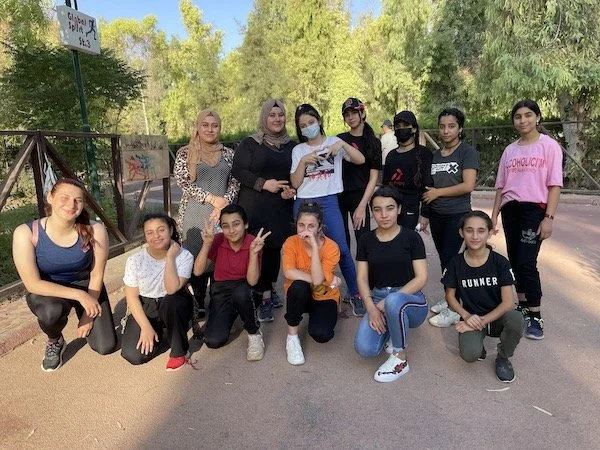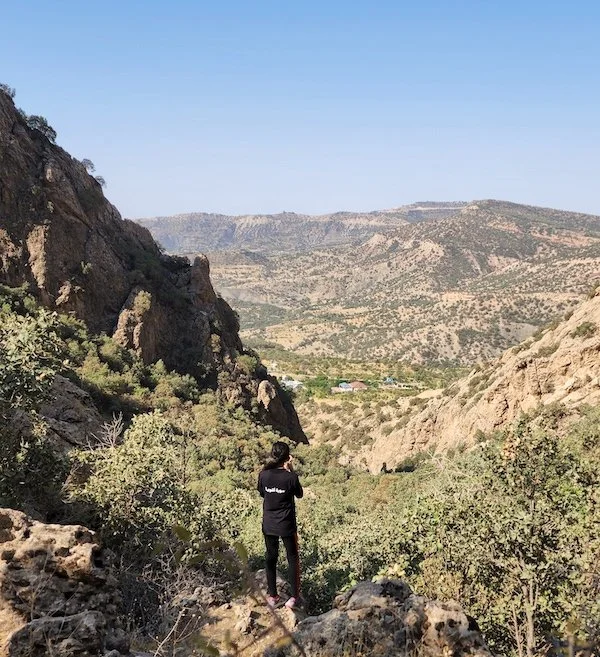Being Free to Run Part 4: Harsham and Baharka Camps
Although it’s the final segment in our ‘Being Free to Run’ series, we are ending by going back to where it all began in 2018 in Iraq, in Erbil. In this post, we hear from the young girls who live in two of Erbil’s main camps for internally displaced people (IDPs), Baharka and Harsham. The girls, along with their families, fled Mosul, Iraq’s second-largest city, and the surrounding towns such Sinjar, Baashiqa and Ba’aj, after the areas were captured and under the control of ISIS in 2014. For most of the girls, their hometowns only permitted sport for girls until they reached puberty, after which it was something deemed to be inappropriate.
“As our parents taught us, it is not permissible for a girl to go out and participate in sports outside the house” — Alaa
Free to Run works with girls and young women between the ages of 14 and 25 who are in the midst of adolescence. During this time, we are encouraging girls to challenge perceptions of who they can be in society - starting with sport participation, but going far beyond into their daily lives as well. Now in its fourth cycle, the program alumni radiate much power and are now shaping conversations within the camps and helping Free to Run reach more girls.
As Rasha will describe, running was the beginning of a conversation with family and the wider community, that being free to run does indeed create safe spaces for the girls to develop confidence and friends, and to reclaim public space. When asked what it means to be free to run, Rasha described it as:
“A very wonderful and different feeling, at first my family was like the rest, they were not satisfied with me running and doing sports outside the house, but with time and my insistence and commitment, they noticed the positive change in my mentality, activity, and how my social circle began to grow. Free to Run respects our culture and traditions. After a period of 3 years of my commitment with Free to Run, I feel comfortable when I run and practice sports even in public facilities, and I hope all the girls in our camp will join us. So far, I encouraged some of my friends to run and I try to communicate with their families and inform them of the activities of Free to Run to convince them to register their daughters with us, and so far, I was able to convince more than 10 girls’ parents” — Rasha
Free to Run is not just about running, ultimately. The organization aims to support the development of girls’ and young women’s leadership to exercise self-determination, challenge negative norms, and boldly reclaim public spaces. For many of the young girls living in Baharka and Harsham, one public space which was disrupted during the upheaval and trauma of having to flee their homes, was school. The coronavirus pandemic compounded the trauma - putting education at a standstill, stressing the economic situation of families already experiencing poverty and increasing instances of gender-based violence in the home. There is a real poignancy to Rasha’s words that being free to run also encouraged her and other girls on the program, to reclaim their space at school during this challenging time:
“Free to Run is one of the most wonderful organizations that I have dealt with…As a person who has dealt with many organizations and joined many activities and training, I have never seen such an organization as Free to Run who is supporting girls to complete their education, not just sports. They aim to make girls strong, educated leaders. A lot of the girls I know have completed their education because of Free to Run encouragement” — Rasha
This is the very movement that being free to run is about, that it not only becomes normal to see girls from Baharka and Harsham running in Sami Abdulrahman Park or hiking in the beautiful mountains of Shaqlawa, but that it becomes normal for the girls to be at school, at university, and more importantly, wherever they want to be.
“Being Free to run is not an ordinary thing. When I run, I feel very relaxed, and when I mingle with the rest of the team, I learn from their culture and see the world from a new angle. I feel that I am a lucky girl because my parents do not pay attention to society's reactionary talk about the girl, that she is not allowed to go out and run-in public facilities. And I feel bad for the rest of the girls who cannot run because of the traditions and their parents’ thoughts. I hope that my participation in these activities will encourage others to join us.” — Noor
Running, which for so many individuals can be a solitary activity, is for the girls an opportunity to be part of a team, a group of confidantes, and a community to grow.
“When I had the opportunity, I wanted to participate to discover my abilities and be part of something bigger than me. They taught me not to give up, especially when participating in many sports and activities such as the marathon. As a girl, I try to give an impression to the rest of the girls and their parents about this organization to encourage them to participate and join us” — Alaa
We know that if more people become part of our movement, we can deepen our support for the likes of Rasha, Noor and Alaa to have these vital conversations with more families to know the power of being free to run. Will you join us?


